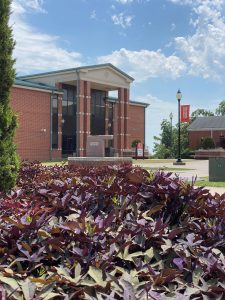Conclusion
After completing the knowledge assessments and final quiz, the hope is that you are better equipped to understand, interpret, and verify sources of information that you will encounter during your academic, professional, and personal research endeavors.
A common thread runs through each section:
- We engage with information every day!
- Knowing how to find and use information for coursework, work or our personal pursuits is essential.
- Having strong information literacy skills will make you a more thoughtful and effective consumer and creator of information.

“Photo of Linscheid Library” by Brandi Schur is licensed under CC BY-SA 4.0 - Asking key questions will not only help you verify credibility and reliability of sources but whether the information is relevant.
- Remembering all sources exhibit some bias, simply because different authors have different backgrounds, experiences, and educations and these can influence us all.
- Understanding the effects of information disorder and what biases are present for the author as well as in your own mind should help you interpret whether you should use or share information.
- Taking the necessary steps, i.e., verifying, checking and answering key questions, is important because it helps us all to become responsible researchers and contributors.
Sources
Original material by book author Brandi Schur and “Photo of Linscheid Library” by Brandi Schur is licensed under CC BY-SA 4.0

